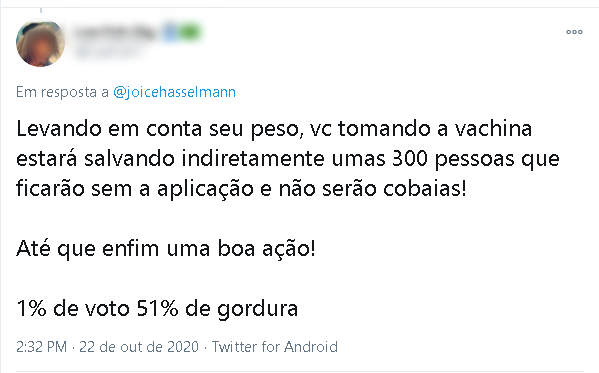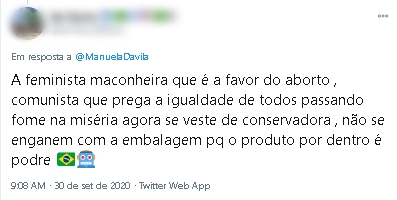
“Fat”,“pig”,“dumb”: candidates are sworn at more than 40 times a day on Twitter during election campaign
The most attacked were candidates for the mayor of São Paulo, Joice Hasselmann (PSL); from Porto Alegre, Manuela D’Ávila (PCdoB); and from Rio de Janeiro, Benedita da Silva (PT), reveals monitoring of political gender violence in networks
Originally published by Jamile Santana in the magazine AzMina
Warning: The report below shows explicit excerpts of misogynist and racist content. We chose not to censor them because we think it is important to exemplify how violent the debate is on networks, how political violence against women spreads through networks and is sexist in its forms, which terms are frequently used and how we can identify it.
On October 17, an internet user decides to post on Twitter a photo of the candidate for the mayor of São Paulo for PSL [a right-wing party], Joice Hasselmann, pointing two guns at the camera. Next to the image, he writes: “(…) Hello, or for those who didn´t sleep won´t have had nightmares with this photo. Here´s someone who shouldn´t even be allowed near a gun. Crazy people can´t have guns. Who gave this psycho a firearms certificate @joicehasselmann”? On the other side of the political spectrum, Manuela D’Ávila, candidate for mayor of Porto Alegre for PCdoB [a left-wing party], also receives offenses. “Message to Porto Alegrenses: In 2018, we appealed to the people of RN not to elect communist Fátima Bezerra, but they elected this ‘cow’ nonetheless (…) Now we appeal to you guys from PA: “Please don’t choose this hacker @ManuelaDavila. She is a bandit! .. ”.

The two posts today have almost 100 likes or retweets each, and are examples of how political violence and sexist discourse against women meet and spread on the networks during elections – without choosing a party or political spectrum. They and other mayoral candidates have received an average of 40 daily tweets with offenses. In general, swearing alluded to the candidates’ bodies, intellect, mental health or the moral aspects of their lives. Many are misogynists, racists, lesbo, trans and homophobic.
These and other offensive tweets were identified by MonitorA, a project by the magazine AzMina along with InternetLab, which collects and analyzes comments directed at candidates from across the political spectrum to understand the dynamics of violence during the elections. In the first month of the campaign, between September 27 and October 27, 93,335 tweets were collected that cite the 123 monitored candidates, in Bahia, Minas Gerais, Rio de Janeiro, Rio Grande do Sul, Santa Catarina and São Paulo. To understand if the posts were violent, a linguist prepared a filter of misogynistic, racist and offensive terms. In addition, it showed that 11% of the tweets had some aggressive content. Among those that had some kind of engagement (like and / or retweet), 1,261 were swear words directed at the candidates.
The terms most used to offend candidates
The most attacked were the candidates for the mayor of São Paulo, Joice Hasselmann (PSDB); from Porto Alegre, Manuela D`Ávila (PCdoB); and from Rio de Janeiro, Benedita da Silva (PT). The offensive terms identified were classified into predominant categories, taking into account the context in which they were inserted. Speeches about the candidates’ physical attributes (such as clothes they wore in the photos, haircut or appearance), moral, sexual and intellectual harassment, discreditation, fatophobia, transphobia, racism. This shows that in addition to being attacked for being women, political violence directed at women is sexist in the nature of their insults and in the context in which these attacks are made.
In the case of Joice Hasselmann, identified by the study as a candidate who is at the top of the ranking among the most offended, fatphobia is the main element of insults. Although most of the attacks are motivated by the change in her relationship with the family of President Jair Bolsonaro, of whom she was very close, the insults attack her for her attributes as a woman.

“When attacks are made on women, it is usually done for physical reasons. There are no attacks on my legislative quality. It is very bad for me as a woman and as a candidate to see these attacks. And the people who defend me in the networks are also attacked. We need to face it, even introducing legislation to punish this type of violence”, considered Joice.
In the case of Manuela D’Ávila, most of the tweets use the term “communist” in a pejorative way, in an attempt to intellectually discredit the candidate, which often happens in political violence aimed at women. She was attacked a lot after the launch of the official photos of the campaign, in which she appears in more formal clothes than usual. She was called “boutique communist”, “fake communist” and “sham communist”. “The other candidates must be terrible if this little communist is ahead in the polls. @ManuelaDavila”. Other comments however are even more aggressive” “Oi @ManuelaDavila ! May your soul boil in hell, you f * cking dirty bitch *. The tweet has been deleted since its posting.
“I have been subject to these attacks at least five years, since I was still pregnant with Laura and they created the first fake news that said I was buying her trousseau in the United States. Since then, they have consistently destroyed my image and have sought to attack me, verbally, physically and on the networks. Network violence, in my case, was taken to the street. The first assault my daughter suffered was in October 2015, by a woman who slapped the sling I was wearing with my daughter inside. This study shows the intensity of the attacks. ”, said Manuela in an interview with the magazine AzMina.

Manuela says that violence impacts her life in a very direct way. “Where I go, how I go there, how I prepare to get there. The routine with my daughter, husband and stepson has been transformed. The campaign too. We spend half the time denying fake news. It is sad but it also changed my activism. It made me connect with other women, write a book and create an institute. My whole life was guided by that. After 2018 we created the ‘What if it were you?’ project, that fights hate networks and fake news. It has become a mission for all of us who defend democracy ”.
Benedita da Silva, a candidate for mayor of Rio de Janeiro for the PT [a left-wing party], suffered racist and verbalized sexual attacks. “Sue her tail off @dasilvabenedita”, wrote one user. The content has been removed. She was also sometimes referred to as “lover” of former President Luiz Inácio Lula da Silva.
!["A black candidate was rejected for affirmative action for being "pretty" says TJDF [Court of Appeals of Distrito Federal] A question: if she is white, but ugly, is she entitled to be in the quota? But for a white woman to be in a quota, she has to be very ugly. So @ jandira.feghali is a white member of the quota? And @dasilvabenedita received 2 parts right. What a joke!"](https://internetlab.org.br/wp-content/uploads/2020/11/Benedita.png)
“The internet is a space of contradiction because it enhances the opportunities for more women to be heard, giving space for campaigns to happen, but it also allows a structure to organize itself by taking advantage of the feeling of anonymity, enabling this violence”, highlighted Fernanda K. Martins, anthropologist and coordinator of the Inequalities and identities area of InternetLab. Furthermore, according to her, gender violence is historical and structural. “The internet did not create this type of violence, but it did recreate these spaces of violence that already existed in society”, he details.
An example of how this violence takes place outside the internet is the case of Renata Castro, who, according to UOL, reported that she was an electoral worker for the Cazzolino family, a traditional family in the politics of Magé, Rio de Janeiro State. She was murdered on her doorstep, shot 14 times. The victim was known in the city for her videos of accusations against the current Mayor’s Office. Until the publication of this report, no one has been arrested for the crime. In August, the pre-candidate for councilor for the Brazilian Socialist Party (PSB), Sandra Silva, was also murdered at home. The suspect was arrested in early October.
Most used terms
We identified in the insulting tweets directed at the candidates 324 different offensive terms. In addition to “communist” (used in a pejorative way and not as a definition of a political position) and “peppa”, which were the most used terms, and their variations such as “filthy communist”, “naughty communist”, “ridiculous peppa”, etc., other words often appear as “dumb”, “hypocritical”, “pig”, “false”, “ridiculous”, “slut”, “pothead” and “liar”. In the case of candidate Erika Hilton, a state deputy for the Activist Bench who is a trans woman, some tweets were transphobic. “It is difficult to talk with a transvestite, there are no concrete proposals, just soft talk! It gives the impression that you are in this one just to earn a salary at the expense of fools reciting the LGBT diatribe. Do not trust this human dung! ”.

“One can observe in the tweets that, despite the fact that all the candidates were the subject of speeches that brought up hierarchies permeated by gender inequality, each of them received insults that highlighted the characteristics that connect them with identities or specific political niches. For this reason, we can say that the offenses are not only related to the fact that the candidates are women, but there is also an articulation between the inequalities of gender, race, sexuality and political ideology ”, says Fernanda.
Invariably, women are also sexually harassed on their social networks. “Suck my d* ck”, said a user to Carla Ayres, candidate for councilor for PT in Florianópolis. Carla is a lesbian and has also suffered lesbophobic attacks on other social networks.

Impact
For the professor and activist, co-director of #MeRepresenta, a member of #VoteLGBT and the Feminist Network of Jurists (deFEMde), Evorah Cardoso, many users believe that offending other people on social networks is freedom of expression. “They believe that the internet is a free space and that the effects of offensive speeches are minimized, but this is not true. When one candidate verbalizes hatred against another, there is a dissemination of that content legitimizing forms of violence in society. It makes people who agree with the attacks feel better and it ends up being reproduced in real life. An offense on the internet is not a simple offense, it is an attack that must be combated ”, she defends.
Also according to the professor, it is necessary to discuss the problem socially. “Everyone has some degree of responsibility. Candidates who also reproduce hate speech, platforms that do not operate transparently, so we do not know what content is promoted or moderated, the legislature that does not create control mechanisms and the Electoral Courts that are not involved despite being able to do so ”.
Mariana Valente, director of InternetLab, recalls that toxic speech, hate speech and offensive posts are not necessarily related, but are faces of the same problem and hinder women’s path in politics. “Hate speech is talk that inferiorizes the person or a group because of such characteristics as gender, race or sexual orientation”. Several of the offenses that we observed do not directly contain this – such as the case of using ‘communist’ pejoratively, for example. However, they create a boiling pot with the result that in practice, there is an attempt to inferiorize or silence the candidates because they are women.
While official mechanisms are not being created, it is up to the candidates and users of the platforms themselves to ask for the exclusion of offenses and to seek protection. Only during this past week alone, there were 23 thousand posts to the network. Today we are filing a request for a protective measure against people who physically threaten me, the team and voters, “says Manuela Dávila.
MonitorA is an observer of political violence against candidates on the networks, a project by the magazine AzMina and InternetLab, in partnership with the Update Institute. The data analysis tool was developed by the Volt Data Lab and the glossaries of terms searched were developed by the hate speech researcher, Yasmin Curzi.
At InternetLab, MonitorA is one of the fronts of the project Recognize, Resist, Remedy, a research partnership with the Indian organization IT for Change, supported by the IDRC (International Development Research Center), on the theme of gender-based online hate speech. To know more about the different initiatives that this project comprises, click here.
